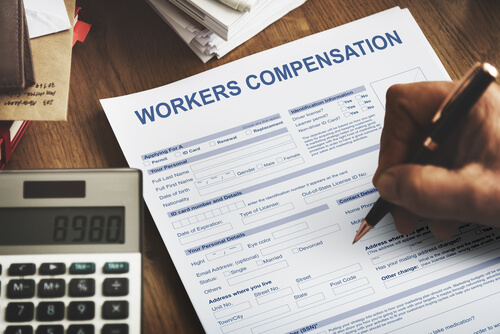Being injured on the job can lead to a cascade of challenges, from mounting medical bills to confusion about your rights under workers’ compensation laws. Many workers find themselves in this predicament, underscoring the vital need for a knowledgeable and experienced workers’ compensation attorney to navigate the complexities of the system and advocate for your rights.
Toc
- 1. Understanding Your Rights and Benefits
- 2. The Importance of Hiring a Workers Comp Attorney
- 3. Finding the Best Workers Comp Attorney for Your Needs
- 4. Related articles 01:
- 5. Common Pitfalls to Avoid When Filing a Workers Comp Claim
- 6. What to Expect During the Workers’ Comp Process
- 7. Related articles 02:
- 8. Frequently Asked Questions
- 9. Conclusion
In this comprehensive guide, we will explore the importance of hiring the best workers comp attorney, how to find the right legal representation for your needs, common pitfalls to avoid, and what to expect during the claims process. By grasping these key aspects, you can more effectively navigate the intricacies of workers’ compensation and secure the benefits you are entitled to.
Understanding Your Rights and Benefits

Workers’ compensation is a state-regulated insurance program designed to provide financial support to employees who suffer job-related injuries or illnesses. The primary purpose of this program is to ensure that injured workers receive the necessary assistance to recover and return to work. Understanding your rights and the benefits available is crucial for anyone facing a workplace injury.
Purpose of Workers’ Compensation
The primary goal of workers’ compensation is to provide financial aid to injured employees without requiring them to prove employer negligence. This no-fault system allows workers to receive benefits regardless of who is at fault for the injury. Recently, many states have begun emphasizing return-to-work programs as a key component of workers’ compensation. These programs aim to help injured workers safely return to their jobs or find new employment opportunities, reducing long-term disability and promoting economic recovery.
Types of Benefits Available
Injured workers may be eligible for various types of benefits, including:
- Medical Expenses: Coverage for medical treatments, hospital stays, and rehabilitation.
- Lost Wages: Compensation for income lost due to the inability to work during recovery.
- Disability Payments: Financial support for permanent disabilities resulting from the injury.
Despite its intent, the workers’ compensation system can be complex and challenging to navigate. Insurance companies often employ tactics to minimize payouts, leaving injured workers feeling lost and overwhelmed. Studies conducted in 2024 indicate that individuals with legal representation are significantly more likely to receive the maximum compensation they deserve compared to those who attempt to handle their claims independently.
The Importance of Hiring a Workers Comp Attorney
Having a skilled workers’ compensation attorney on your side can be a game-changer in securing the benefits you need. Here are some key advantages of hiring the best workers comp attorney:
Negotiation Expertise
A proficient workers’ comp attorney can effectively negotiate with insurance companies on your behalf. They are well-versed in the tactics that insurance adjusters use to deny or undervalue claims. For example, attorneys can leverage their knowledge of state laws and precedents to challenge insurance company denials based on technicalities. They can also use their understanding of medical terminology and treatment protocols to ensure the insurance company is not undervaluing the severity of your injuries, ultimately building a strong case to secure the maximum benefits possible.
Handling Administrative Tasks
Navigating the paperwork and administrative tasks in a workers’ compensation claim can be a daunting process. An experienced attorney can manage these responsibilities, such as filing appeals, gathering medical records, and communicating with insurance companies. This support allows you to focus on your recovery rather than the complexities of the legal process, alleviating the stress associated with managing a claim.
Appeals for Denied Claims
If your claim is denied, a workers’ compensation attorney can assist you in appealing the decision. They understand the appeals process and can guide you through each step to ensure you receive the benefits you are entitled to, making sure no detail is overlooked in your pursuit of justice.
Finding the Best Workers Comp Attorney for Your Needs

Choosing the right workers’ compensation attorney is essential for the success of your claim. Here are some crucial factors to consider when searching for the best workers comp attorney for your situation:
Experience and Expertise
When selecting an attorney, prioritize those with extensive experience in handling workers’ compensation cases. Look for a proven track record of success in securing favorable outcomes for clients. An experienced attorney will have a deep understanding of the nuances of workers’ compensation law and can navigate the complexities of your case effectively.
Reputation and Reviews
Research the attorney’s reputation by reading online reviews and testimonials from past clients. This can provide valuable insights into their communication skills, problem-solving abilities, and overall level of service. Consider asking for recommendations from friends or family who have been through similar experiences, as personal referrals can often lead to finding a trustworthy attorney.
Communication and Accessibility
Choose an attorney who is responsive and communicative. They should take the time to explain the legal process in a way that is easy to understand. You should feel confident that your attorney will keep you informed throughout your case, addressing any questions or concerns you may have promptly.
Fees and Payment Options
Most workers’ compensation attorneys operate on a contingency fee basis, meaning they only get paid if they win your case. Understand the attorney’s fee structure and any additional costs associated with your claim. It’s essential to have a clear understanding of your financial obligations before proceeding, ensuring you are not caught off guard by unexpected fees.
Location and Familiarity with Local Laws
Working with an attorney who is located in your state or region is beneficial, as they will be familiar with the specific workers’ compensation laws and procedures in your area. Local attorneys can provide valuable insights into how cases are handled in your jurisdiction, enhancing your chances of a successful claim.
To find the best workers comp attorney for your needs, start by searching online with keywords like “best workers comp attorney [your state].” You can also check attorney directories and professional organizations, such as the American Bar Association’s Lawyer Referral Service. After identifying potential candidates, schedule free consultations to assess their experience, communication style, and overall approach to your case.
Common Pitfalls to Avoid When Filing a Workers Comp Claim

Filing a workers’ compensation claim can be fraught with challenges. Here are some common mistakes that can jeopardize your chances of success:
Delaying Reporting
Promptly reporting your injury to your employer is crucial. Delays in reporting can negatively impact your claim and may result in a denial of benefits. However, some argue that immediate reporting can sometimes lead to unnecessary medical attention or pressure from employers to return to work too soon. In some cases, it may be beneficial to consult with an attorney before reporting the injury to ensure you fully understand your rights and options.
Failing to Seek Medical Attention
Seeking immediate medical attention after an injury is essential for both your health and your claim. Delayed treatment can raise questions about the severity of your injury. The rise of telemedicine has created new opportunities for injured workers to access medical care quickly and efficiently. However, it’s crucial to consult with your attorney about the specific requirements and limitations of using telemedicine for workers’ compensation claims.
Not Following Designated Providers
Many employers require injured workers to see designated medical providers for treatment. Failing to comply with this requirement can jeopardize your benefits. It’s essential to understand your employer’s policies and follow the necessary protocols to avoid complications with your claim.
Lack of Detailed Records
Keep meticulous records of your injuries, medical treatments, and lost wages. Documenting these details is vital for substantiating your claim. A well-organized record can significantly strengthen your case and provide crucial evidence during negotiations or hearings.
Negotiating Settlements Without Legal Advice
Avoid negotiating settlements without consulting a workers’ compensation attorney. Legal professionals can provide invaluable guidance and ensure you do not accept an unfair offer. An attorney can help you understand the true value of your claim and negotiate on your behalf to secure the best possible outcome.
What to Expect During the Workers’ Comp Process

Understanding the steps involved in a workers’ compensation claim can help you navigate the process more effectively. Here are the typical stages:
Reporting the Injury
After you have reported the injury to your employer, they should provide you with a claim form to fill out. This document is crucial, as it officially initiates your workers’ compensation claim. It’s essential to fill out the form accurately and thoroughly, providing all necessary details about the injury and how it occurred.
Medical Evaluation
Once your claim is filed, you will likely be required to undergo a medical evaluation. This evaluation is conducted by a doctor designated by your employer or their insurance company. The purpose is to assess the extent of your injuries and determine eligibility for benefits. It is important to be honest and clear during this examination, as the doctor’s report will significantly impact the outcome of your claim.
Claim Approval or Denial
After your medical evaluation, the insurance company will review your claim and decide whether to approve or deny benefits. If approved, you should start receiving necessary benefits, which may include medical expenses coverage and a portion of your lost wages. If denied, the insurer should provide a reason for the denial, which is critical for further action.
Dispute Resolution
If your claim is denied or if you disagree with the benefit amount provided, you have the right to dispute the decision. This often involves negotiating or mediating with the insurance company and may require the involvement of a workers’ compensation attorney to represent your interests. Understanding the reason for denial and gathering additional evidence can strengthen your position during this stage.
Settlement or Hearing
If disputes cannot be resolved through negotiation, the next step is often a formal hearing before a workers’ compensation judge. Both sides will present their arguments, and the judge will issue a decision regarding your benefits. In some cases, a settlement may be reached before or during the hearing process. A knowledgeable attorney can be crucial during these proceedings to ensure your rights are protected and you receive the compensation you deserve.
Navigating the workers’ comp process can be overwhelming, but with the right preparation and legal support, you can effectively manage the complexities and work towards a successful resolution of your claim.
Frequently Asked Questions

How Long Does It Take to Receive Benefits After Filing a Workers’ Comp Claim?
The timeframe for receiving workers’ compensation benefits can vary significantly depending on several factors, including the complexity of your case and the efficiency of your employer’s insurance company in processing claims. Generally, after your claim is approved, you should begin receiving benefits within a few weeks. However, if there are disputes or denials, it could take much longer, possibly requiring legal intervention to resolve. It’s essential to stay in communication with your employer and their insurance provider to ensure a smooth and timely process.
Can I Be Fired for Filing a Workers’ Comp Claim?
It is illegal for an employer to retaliate against you for filing a workers’ compensation claim. Retaliation can include wrongful termination, demotion, harassment, or any adverse employment actions. If you experience retaliation, you may have grounds to file a separate legal claim against your employer. Documentation of retaliatory actions and consulting with a lawyer can provide you with necessary assistance and protection against unlawful treatment. Knowing your workplace rights is crucial to navigating your employment situation effectively while pursuing your claim.
Navigating the world of workers’ compensation can be challenging, but understanding your rights and the claim process, as well as seeking legal guidance, can greatly improve your chances of a positive outcome.
Conclusion
In summary, the workers’ compensation system is designed to provide support and financial assistance to employees who have suffered work-related injuries or illnesses. It is essential for injured workers to understand the intricacies of the claims process and to be proactive in managing their cases. By maintaining thorough documentation, seeking medical evaluations, and considering legal counsel when necessary, employees can protect their rights and ensure they receive the benefits to which they are entitled. Remember, the goal of workers’ compensation is to aid in recovery and facilitate a return to work, allowing both the employee and the employer to benefit from a fair and efficient resolution.
















